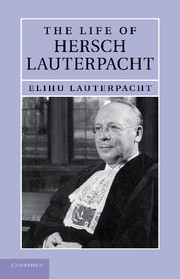Book contents
- Frontmatter
- Contents
- List of plates
- Acknowledgments
- List of abbreviations
- Prologue and introduction
- 1 Background and early years, 1897–1919
- 2 Vienna: research, engagement and marriage, 1919–1923
- 3 England and the London School of Economics, 1923–1937
- 4 Cambridge, 1937–1939: the Whewell Chair
- 5 The war years, Part I: September 1939–January 1941
- 6 The war years, Part II: February 1941–March 1942
- 7 The war years, Part III: April 1942–December 1944
- 8 Human rights
- 9 The years of practice, 1945–1950
- 10 1950–1954
- 11 The International Court of Justice, 1955–1960
- Epilogue: the man
- Appendix 1 The published writings of Sir Hersch Lauterpacht
- Appendix 2 Biographical and academic writings on Sir Hersch Lauterpacht
- Appendix 3 Obituaries of Sir Hersch Lauterpacht
- Appendix 4 Chronology of significant events in the life of Sir Hersch Lauterpacht
- Index
2 - Vienna: research, engagement and marriage, 1919–1923
Published online by Cambridge University Press: 01 June 2011
- Frontmatter
- Contents
- List of plates
- Acknowledgments
- List of abbreviations
- Prologue and introduction
- 1 Background and early years, 1897–1919
- 2 Vienna: research, engagement and marriage, 1919–1923
- 3 England and the London School of Economics, 1923–1937
- 4 Cambridge, 1937–1939: the Whewell Chair
- 5 The war years, Part I: September 1939–January 1941
- 6 The war years, Part II: February 1941–March 1942
- 7 The war years, Part III: April 1942–December 1944
- 8 Human rights
- 9 The years of practice, 1945–1950
- 10 1950–1954
- 11 The International Court of Justice, 1955–1960
- Epilogue: the man
- Appendix 1 The published writings of Sir Hersch Lauterpacht
- Appendix 2 Biographical and academic writings on Sir Hersch Lauterpacht
- Appendix 3 Obituaries of Sir Hersch Lauterpacht
- Appendix 4 Chronology of significant events in the life of Sir Hersch Lauterpacht
- Index
Summary
Though there has been some confusion in the documents, it appears that Hersch began his studies in Vienna in 1919. The copy of his first residence registration card that still remains in the Vienna official archives is dated 16 July 1920 and records that he was travelling on a passport of the Lemberg Police Directorate issued on 7 May 1920, was a student of the University of Vienna and had a previous residence in Lemberg. However, there are other indications that he was already a student in Vienna in 1919. One is derived from the record in the University's archives of Hersch's academic progress. The other is a statement in a note by a contemporary of his at the university saying that he had ‘met Hersch in 1919’.
Hersch first read law, attending lectures by Professor Hans Kelsen, and graduated as ‘Doctor jur’ on 13 June 1921. Kelsen, in his note about Hersch, recalls that international law at Vienna was taught not only by Professor Strisower but also by Professor Alexander von Hold-Ferneck, and that, although Hersch spoke German fluently, he did so with:
the unmistakable accent of his origin. This was, under the circumstances which actually existed in Vienna at that time, a serious handicap and may explain the fact that he, in spite of his profound knowledge in all the subject matters taught at the Law School, received the degree of Doctor of Law by no more than a passing mark from the majority of examining professors.
- Type
- Chapter
- Information
- The Life of Hersch Lauterpacht , pp. 26 - 37Publisher: Cambridge University PressPrint publication year: 2010



